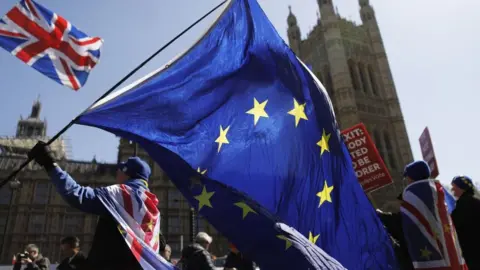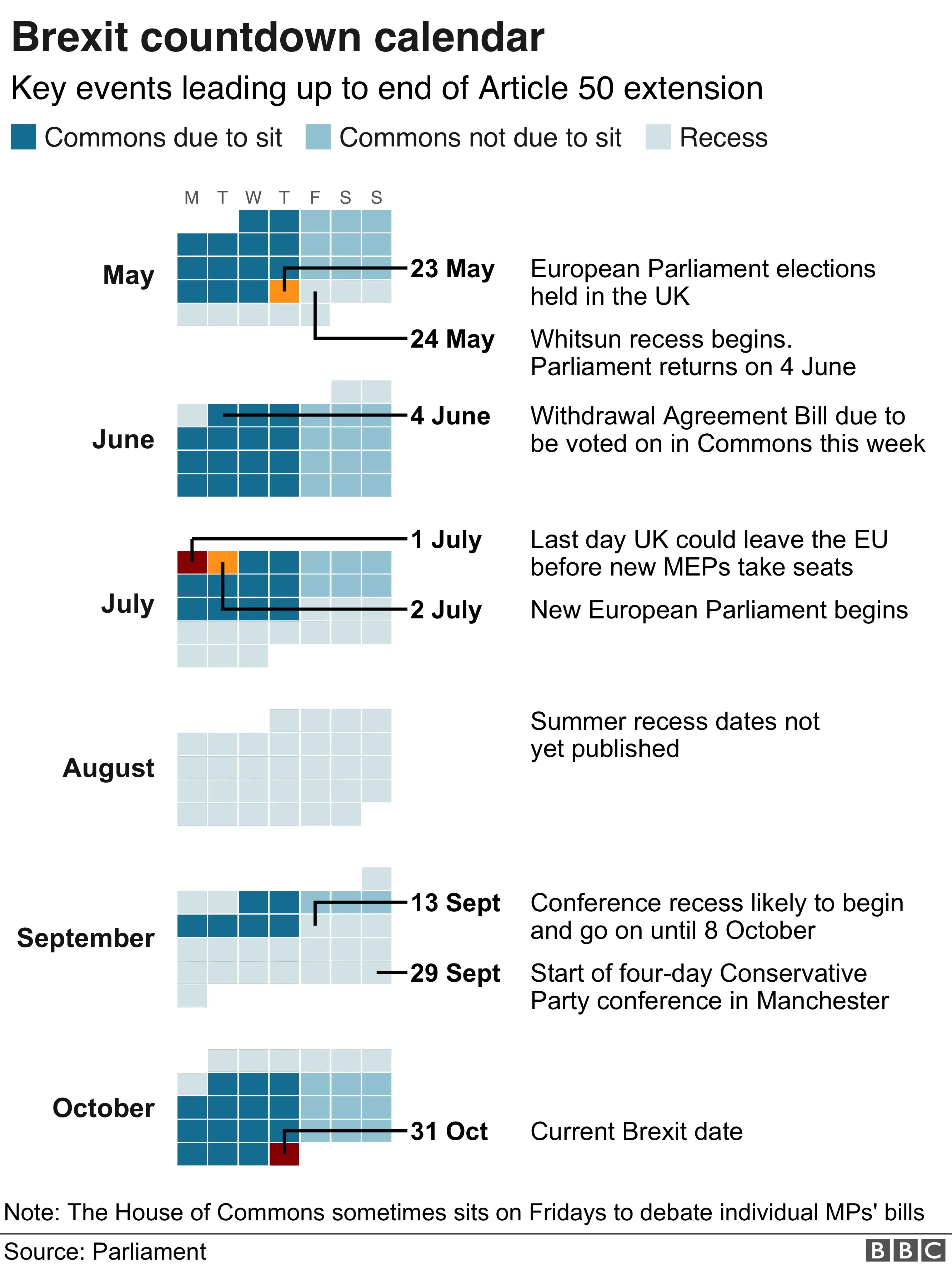Brexit: Matt Hancock urges MPs to vote for bill
 Getty Images
Getty ImagesMPs who want to deliver the referendum result should vote for the government's Brexit bill and worry about the detail afterwards, a senior minister has said.
A vote on the Withdrawal Agreement Bill - the legislation that will implement Brexit - is expected early next month.
Health Secretary Matt Hancock said MPs should back it "no matter the details" they want in a future relationship.
But ex-Brexit Secretary David Davis says if the bill passes, the PM's successor will "have their hands tied".
Theresa May announced last week that MPs would vote on the bill in the week beginning 3 June. If it is not passed, the default position is that the UK will leave the EU on 31 October without a deal.
BBC political editor Laura Kuenssberg says the vote "really is the last roll of the dice" for the prime minister, who has had her withdrawal agreement with the EU rejected three times in the Commons.
Mrs May last week promised to set out the timetable for her own departure after the vote.
Mr Hancock told BBC Radio 4's Today: "If you want, as an MP, to leave the European Union and deliver on the result of referendum - no matter the details you want to see in terms of the future relationship - you need to vote for legislation and then have the debate in the committee stages later on exactly what the details are.
"No doubt there will be votes on really big issues, on whether to have a 'People's vote' or whether to have a customs union, both of which I'm against."
The committee stage is where a bill is considered line-by-line by MPs and is an opportunity for changes to be made to the wording or new clauses to be added.
Any fresh demands that Parliament came up with at that stage - for example, for a customs union with the EU - would then need to be taken back to Brussels.
The EU has said it will not re-open negotiations on the withdrawal agreement, but could make changes to the political declaration - a non-binding document that sketches out the shape of the future relationship between it and the UK.


Theresa May insists that the Brexit plan she'll discuss with her cabinet on Tuesday is "new" - and not to be confused with the deal that went down to defeat three times in the Commons.
And some of it will represent a fresh approach - further moves on workers' rights to try to appeal to Labour MPs, for example. But some of it will be familiar, including the controversial Northern Ireland backstop which the DUP and Conservative Brexiteers, in particular, loathe.
Irrespective of the specifics, Matt Hancock gave a sneak preview of the argument the prime minister will make herself.
She plans to deliver a speech later this week spelling out that this could be the last chance of leaving the EU with a deal.
Vote down the latest legislation, and both no deal and no Brexit at all become more likely.
The trouble is, some MPs find the former attractive and others are willing to gamble on the latter.

Mr Hancock, who is tipped as a potential centrist candidate for next Tory leader, insisted Mrs May's Brexit plan would include "new proposals" for MPs to vote on - those are expected to include enhanced protection for workers' rights and the environment.
But prominent Brexiteer Mr Davis, who is firmly on the right of the party, told BBC Radio 4's Today he would not support the bill and rejected the idea it was "a great new offer".
"If we pass that act, it opens things up so that a successor to the prime minister, the next prime minister, will have their hands tied," he said.
"I think the next prime minister must have the right to reset the negotiation on their terms."
Change UK's interim leader Heidi Allen told Today she believed the issue of Brexit was going "around and round in circles" and Mrs May's plan would fail in the Commons once again.
"I just don't believe that deal will go through, nor have we for many, many months now," she said.
Jeremy Corbyn said he would consider any new proposals "very carefully", but he said what was being talked about did not appear "fundamentally different" from what was already on the table.
As things stand, Labour MPs will vote against it, he said.
Talks between the government and Labour - to see if they could find a compromise Brexit deal, despite differences over issues including membership of a customs union and a further referendum - lasted six weeks before ending on Friday without agreement.
Shadow Brexit secretary Sir Keir Starmer blamed the collapse of talks on the inability to "future proof" any agreement against an "incoming Tory leader", and said although the two sides had conducted the talks "in good faith", they were "a long way apart" on substance.
But Mrs May blamed the lack of a "common position" within Labour, and said she would consider putting different Brexit options to MPs to see which ones "command a majority".
Downing Street said the cabinet would discuss the merits of holding such indicative votes at its meeting on Tuesday morning.
Meanwhile, Mr Hancock, when asked whether he would run for Tory leadership, said he didn't "rule out" standing in a future contest but added: "There isn't a vacancy as yet."
"I find it flattering that a lot of people have asked me to put my name forward," he said.


